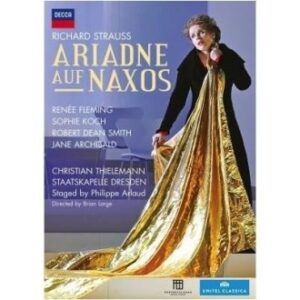The 2012 Baden-Baden Festival’s big feature was Ariadne auf Naxos, with two superb Straussians in pivotal roles: Christian Thielemann at the helm, and Renée Fleming as the eponymous heroine. Thielemann does not disappoint. Leading the Staatskappelle, Dresden, he knows this glorious chamber score and clearly has great respect for it. The attention to textural detail is to be treasured; his tempo choices and attention to dynamics are particularly insightful in the Prologue, where moods change on a dime and the interactions among characters can be helter-skelter. In the opera itself he plays into the strengths of all of the singers and elicits stunningly warm playing from the orchestra. You’ll rarely hear this score so well led.
These performances were Fleming’s first undertaking of Ariadne. There is no doubt that she has lost some of her volume over the years, but Ariadne is a good fit for her nonetheless, particularly with such a sympathetic conductor, who holds back when needed and sculpts dynamics to her needs. The voice is still creamy and lush and her breath control remains remarkable. If the low notes of the score are not as well articulated as we might want, at least the high notes are still solid.
Most prefer a bigger-voiced Ariadne (Jessye Norman; Deborah Voigt; Leonie Rysanek) but Fleming’s sense of the Straussian line cannot be faulted. However, she always has been a well-taught, rather than instinctive, actress, and here she is quite bad, petulant during the Prologue (an acceptable approach) and actually looking bored and/or thoughtful rather than distraught for the first half of the opera proper. It might be the direction and production, but the close-ups do not help either: we can see every calculated move, every rehearsed reaction. And this includes a type of prepping for long, high phrases—you sense a girding of the loins for the final moments of “Es gibt ein Reich”. The voice itself does not cut through the way it ought to, and the overall feel is that this is not-quite-Ariadne.
The direction and sets are by Philippe Arlaud and they do Strauss and Hoffmansthal no favors. The Prologue is set backstage amid crates, mirrors, boxes, and a piano, in modern dress. The Commedia cast is in striped shirts and suspenders—like clowns. Not bad. The opera itself, however, features a bright white, unadorned, corrugated, semi-circular, wavy back wall with stairs leading to it; an audience of men in black tie and women in green gowns (and black eye masks) sits motionless and emotionless on chairs—we assume these are guests of the “richest man in Vienna.” Three lamps hang from the ceiling.
At the apotheosis the “audience” leaves and their chairs ascend to the heavens and there are fireworks. In between, the Minotaur shows up dragging Ariadne across the stage on a gold lamé cloth, in which she later relaxes. Huh? What is the over-riding idea? That Ariadne is in the middle of nowhere? Zerbinetta and her cronies are in colorful outfits but the Commedia scenes are not particularly funny. I’ve always assumed that “Ariadne” was about love becoming frozen in time and space vs love being a fluid, changing thing. As far as Arlaud and Fleming are concerned, it is about an unhappy woman, wearing black, until her lover returns, at which time she changes into a red dress. It’s a little dumb.
Despite being saddled with a curly wig reminiscent of Harpo Marx, Sophie Koch is the wonderful Composer—impetuous, nervous, practically feverish in her passions—singing with bright tone and absolute security. Jane Archibald’s Zerbinetta, a pretty, young blond in the Prologue and far tartier in the opera (with Louise Brooks wig, which turns her somewhat harsh), does not command a stage the way Natalie Dessay or Edita Gruberova do (or even the way Kathleen Battle once did). The voice has brilliance and she sings with security and accuracy, but the very top thins considerably.
Robert Dean Smith has a voice that lacks an individual stamp, but his absolute security and tirelessness make his Bacchus—an utterly thankless, almost impossible role—a success. With the exception of Eike Wilm Schulte’s Music Master, the smaller roles are not impressively taken, with a joyless quartet of funsters and a Dancing Master who appears to be on the verge of losing his voice. The Majordomo is well spoken and acted by René Kollo, once a fine Wagnerian tenor. The trio of Najade, Dryade, and Echo are good enough and look terrific.
And so, a mixed bag. Fans of Fleming will not see or hear much wrong, and it is true that she does her best work these days for Thielemann. But she does not shine in comparison with any mentioned above (nor with the transcendent Gundula Janowitz, who is more in her Fach, to be fair). Dean Smith is to be recommended, and so is Archibald—and of course Thielemann. But the production is a dud, and you can do better on DVD: The Met’s performance on DG with Norman, Battle, James King, and Tatyana Troyanos under James Levine is stunning; and for an odd but riveting reading, try the one on TDK from Zurich, directed by the ever-weird Claus Guth and starring Emily Magee.
































